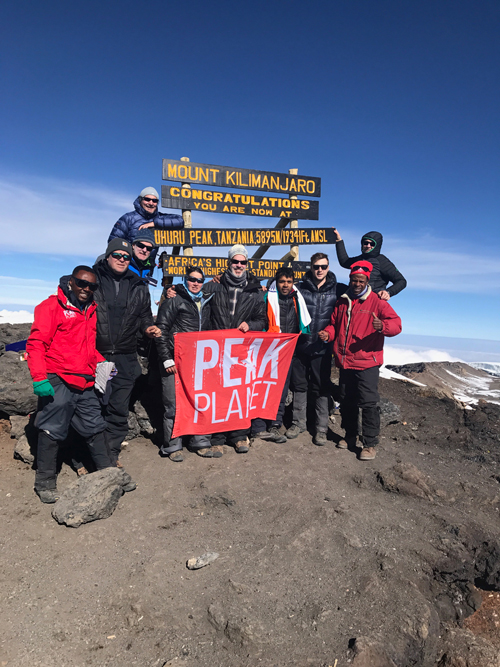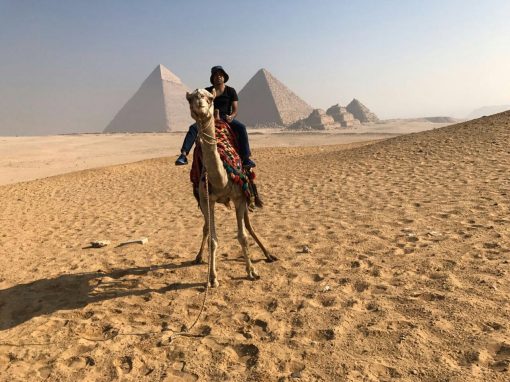The first thing Sam Pasupalak did after becoming insanely wealthy early in 2017 was head to New Zealand for a week, bucket list in hand.
“I think the money hit the bank on Feb. 1 and on Feb. 2 we were gone,” says Pasupalak, laughing.
“That week was one of the best weeks of my life.”
For six obsessive, all-consuming years, from the moment he left University of Waterloo, Pasupalak had worked on turning Maluuba, a natural language and AI startup, into a success. There were many 16-hour days and 80-hour weeks, first in the Tannery, at Velocity and Communitech, then at offices in uptown Waterloo, and then in Montreal, which at the time was an emerging hub for AI.
So when the company was bought by Microsoft for what is believed to be about CDN$200 million, it was time for Pasupalak, the CEO and co-founder, to put on the brakes, take a step back, and connect with the wider world around him.
And did he ever.
There were trips. To New Zealand. Africa. India, where his parents live. And Egypt. Australia. Nine countries, in all. Backpacking, for most of it.
The bucket list? He checked off bungee jumping, and skydiving, and hang gliding, and ziplining. He learned to scuba dive. He swam in a shark cage. He went white-water rafting. And kite surfing.
He climbed Kilimanjaro.

Sam Pasupalak, fourth from right, atop Kilimanjaro, in Tanzania.
All the things he didn’t have the time, or the money, or the opportunity, to do after university.
“There’s so much in the world that I’ve missed,” he says. “I was in the tech bubble for so long.”
And now?
Now, Pasupalak says, it’s time to figure out his Next Big Thing. To make a difference. To forge, at age 30, the rest of his life. To climb another mountain.
“It’s time to take a step back,” he says, relaxed at a table in Area 151 at Communitech, where he spoke with Communitech News. “It’s time to see how I can make a difference in the world in a bigger way in the future. I don’t know what it’s going to be. I have no idea. But I’ve been in technology for six or seven years and I want to take a different stab at things and explore the world from a different angle.”
The first step, what he calls a “high-level exploration,” begins this autumn in the U.K., where he’ll attend the London School of Economics and begin a Masters degree in political science. He’s reading. History. Philosophy. Biographies. The humanities. All the areas, all the people, he didn’t have time, or inclination, to pay attention to when Maluuba was being forged, when he was a computer science undergraduate at UW.
“I want to be very strategic, and think things through a lot,” he says. “I don’t know how long it’s going to take me to start my next adventure. So, now, [I] just kind of want to figure out how it goes. Aim big, and see how it goes.
“Treat life as a learning experience.”
Much like the learning process of creating Maluuba.
“I was a very simple person who didn’t know much about technology or entrepreneurship or anything,” he says, when the company began.
The founders followed a trajectory familiar to many startups. A diet of non-stop stress en route to building a viable product. A steep learning curve. Attempts to raise money. Near-bankruptcies – three times, in fact, in 2013. Interest from VCs. A CDN$9-million Series A round in 2016. And then the big-time exit, agreed to in principle in January of 2017.
“It was bittersweet,” he recalls, of the decision to sell to Microsoft.
“Maluuba was my baby. From start to finish. You have to give up your baby. That’s a very hard thing to do. We all wanted to build a big company.
“[But] you have to say [to yourself]: ‘It’s a good deal for everyone.’ A good deal for the investors. The shareholders made good money. The employees made good money. It was good for us.
“The employees wanted to work on products that could make an impact – on a bigger scale than Maluuba. So we decided to take the acquisition route.”
Two of the other co-founders, Kaheer Suleman and Mo Musbah, are still at Microsoft, the former as Principal Program Research Manager, the latter as Head of Product.
Pasupalak, not long after the sale, set out on his own. There was that bucket list after all. That, and a determination to make a difference. To say thank you. To give back.
He spent time in India, his birthplace, helping his mother renovate a school for underprivileged kids. He recently wrote a cheque for $500,000 to the University of Waterloo, the school which brought him, and his brother, to Canada to study (his brother, Sumit, is CEO of a tech startup called Ubiq).

Sam Pasupalak in Egypt.
“The University of Waterloo, Velocity, Communitech, all these different institutions helped shape who I am today. And helped me create Maluuba,” he says.
“I’m very, very grateful to the people who helped us when we were nobodies. I’ll always remember them.”
Will he go back to technology in the future?
“The next steps might eventually involve another tech startup, and they might not,” he says.
“It’s all about pushing myself outside of my comfort zone. I believe the more you push you can dream bigger.
“I grew up in a very conservative family in India. I didn’t know much except family, playing cricket. Waterloo pushed me, and now I’m pushing myself.”
The newfound financial freedom, he says, hasn’t changed him.
“I think it’s the way you’re brought up and the values you grow up with that shape who you are. And the environment you’re brought up with.”
He says that when his father, who holds two PhDs, heard about the nine-figure sale of Maluuba to Microsoft, he simply said, ‘Good job.’
“We never went out for a celebratory dinner or anything. He just said, ‘good job.’ We have very simple values in our family.”
His parents, he says, weren’t even so sure about the idea of their sons becoming entrepreneurs.
“When I was starting my company, [my father] said, ‘No, get a job, lead a normal life. Why do you want to struggle and work hard and do all this?
“At the beginning we had a lot of arguments. You know how Indian parents are. They’re very strong in their views. But later on they realized, ‘Let him do this. It’s his passion.’
He says he still sleeps on the floor of his brother’s apartment when he visits Waterloo.
“My brother makes fun of me. I like it that way. Humility. I don’t have a car. I haven’t bought an apartment. Basically I still live a student’s life. I live the startup life that I used to live.”
And then he laughs.
Soon it will be time to get a bit serious. School will begin in a few weeks in London. There’s a future to forge, a difference to make, new mountains to climb.
Literally, in the latter case.
“Mount Elbrus, in southern Russia, the highest peak in Europe,” Pasupalak says with a grin. “I’m going to climb that one next.”

